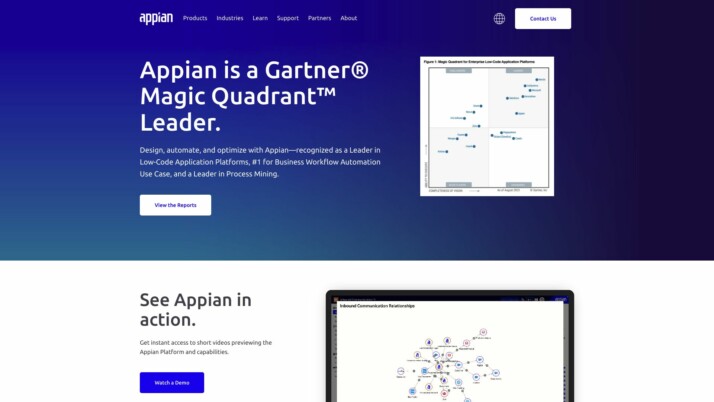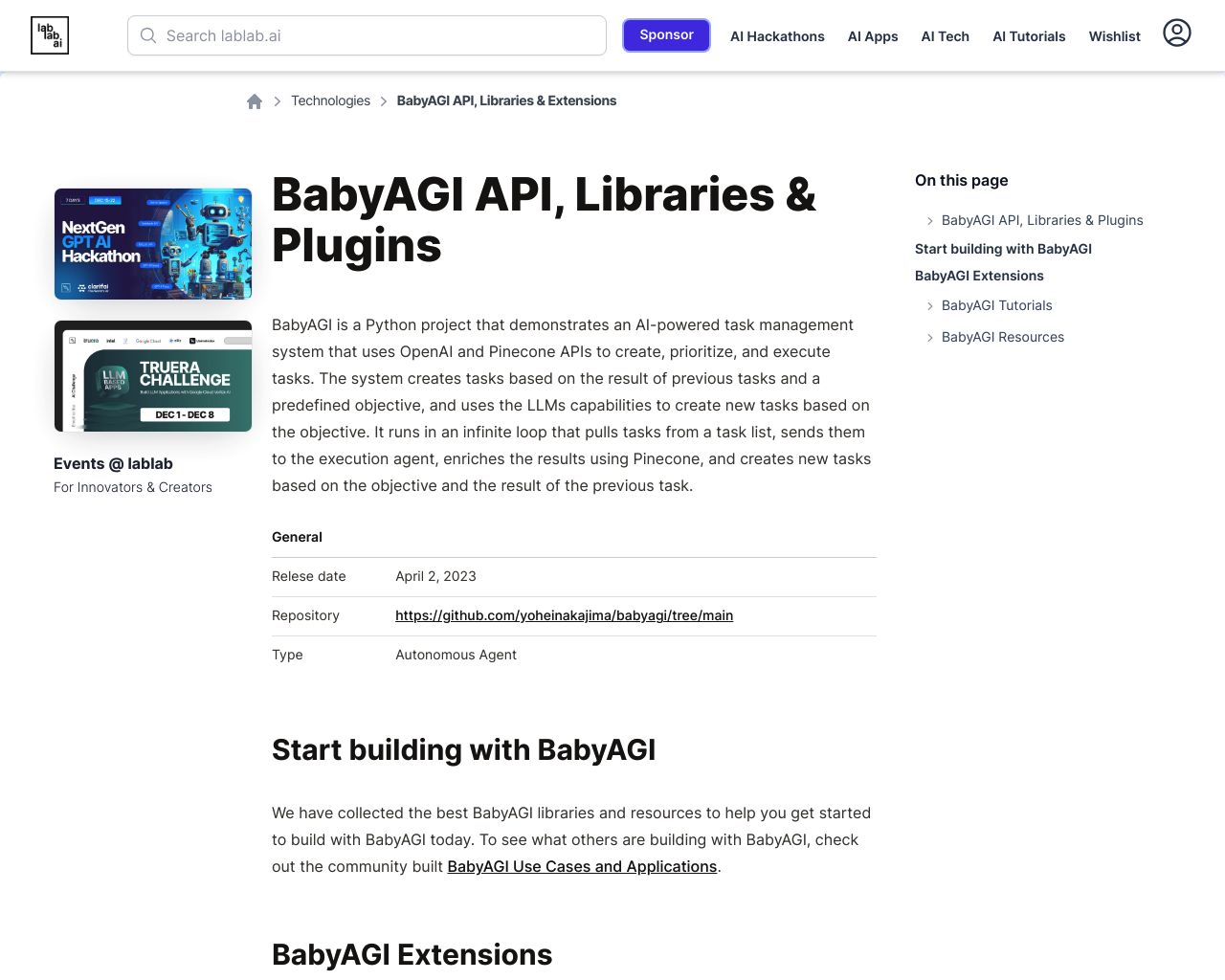Appian vs. BabyAGI: Enterprise AI vs. Open-Source Automation
AI-powered task management and workflow automation tools are revolutionizing how businesses operate. This comparison explores Appian’s enterprise-grade, low-code AI platform and BabyAGI’s innovative open-source approach to autonomous task management. We’ll examine their key features, strengths, and limitations to help you determine which solution best fits your organization’s needs.
Additionally, we’ll introduce SmythOS, a versatile AI development platform that combines the strengths of both systems while addressing their shortcomings. Whether you’re a developer seeking powerful APIs, a business leader focused on scalability and security, or a non-technical user looking for intuitive tools, this guide will equip you with the knowledge to make an informed decision in the rapidly evolving world of AI automation.
Appian Overview
Appian delivers a low-code AI platform that empowers businesses to integrate intelligent automation into their workflows. The platform combines visual development tools with pre-built AI capabilities, allowing users to create sophisticated AI-driven applications without extensive coding knowledge.


Appian’s AI offerings focus on enhancing business processes through intelligent document processing, email routing, and data extraction. The platform excels in industries requiring strict data privacy and compliance, such as finance and healthcare. Its low-code approach democratizes AI development, enabling both technical and non-technical users to build and deploy AI solutions quickly.
Appian delivers a low-code AI platform that empowers businesses to integrate intelligent automation into their workflows.
Key features of Appian’s AI toolkit include document classification, data extraction, and email processing capabilities. The platform integrates with popular AI services like OpenAI, allowing users to leverage advanced natural language processing for tasks such as text summarization and content generation. Appian’s Enterprise Copilot feature provides quick access to curated business information, streamlining decision-making processes.
While Appian offers robust AI integration and low-code development options, it may not be ideal for users seeking highly specialized or customized AI models. The platform’s strength lies in its ability to rapidly deploy AI solutions within existing business processes, rather than in developing cutting-edge AI algorithms. Additionally, Appian’s pricing model can be complex, potentially making it less accessible for smaller organizations or individual developers.
Appian’s AI capabilities seamlessly integrate with its broader low-code application development platform. This integration allows businesses to create end-to-end automated workflows that combine AI with traditional business process management. The platform’s scalability and security features make it particularly suitable for enterprise-level deployments, though smaller organizations may find equally powerful alternatives with more straightforward pricing structures.
BabyAGI Overview
BabyAGI revolutionizes task management through autonomous AI. This open-source project simulates human-like cognitive processes, continuously learning and adapting to new challenges. BabyAGI excels at generating, prioritizing, and executing tasks based on predefined objectives, offering a glimpse into the future of artificial general intelligence (AGI).


Developed by Yohei Nakajima, BabyAGI leverages advanced natural language processing and vector databases to create a dynamic, self-improving system. Its core functionality mimics human thought processes, allowing it to break down complex goals into manageable subtasks and execute them efficiently.
BabyAGI leverages advanced natural language processing and vector databases to create a dynamic, self-improving system. Its core functionality mimics human thought processes…
BabyAGI’s strength lies in its adaptability across various industries. In healthcare, it can analyze patient data and suggest personalized treatment plans. For education, it tailors learning experiences to individual student needs. This versatility makes BabyAGI a valuable tool for businesses seeking to enhance productivity and decision-making processes.
However, BabyAGI’s open-source nature presents challenges. Users must possess technical expertise to implement and customize the system effectively. Additionally, the platform lacks some enterprise-grade features like robust security measures and scalability options, which may limit its adoption in larger organizations.
Despite these limitations, BabyAGI’s innovative approach to AI-driven task management positions it as a frontrunner in AGI development. Its ability to learn, adapt, and solve complex problems autonomously offers a glimpse into the future of intelligent automation, making it a compelling choice for developers and researchers pushing the boundaries of AI technology.
Feature Comparison
Appian and BabyAGI offer distinct approaches to AI agent development, with significant differences in their core components and security features. Appian provides a robust low-code platform focused on enterprise-grade AI integration, while BabyAGI offers an innovative open-source solution for task automation and management.
Appian excels in security and compliance, crucial for industries like finance and healthcare. Its platform includes built-in data encryption, OAuth support, and comprehensive audit logs. BabyAGI, being open-source, lacks these enterprise-level security features out of the box, requiring additional implementation for sensitive data handling.
In terms of core components, Appian offers pre-built AI capabilities such as document classification and data extraction, integrated seamlessly into its low-code environment. BabyAGI, on the other hand, focuses on autonomous task generation and execution, leveraging advanced natural language processing. While Appian provides a structured approach to AI integration within existing business processes, BabyAGI offers more flexibility in creating adaptive, self-improving AI agents.
Both platforms have limitations in certain areas. Appian’s AI capabilities, while powerful, are more constrained within its business process automation framework. BabyAGI lacks some of the enterprise features like scalability options and integration tools that Appian provides. These differences highlight the importance of choosing a platform that aligns with specific project requirements and organizational needs.
Feature Comparison Table
| Appian | BabyAGI | SmythOS | |
|---|---|---|---|
| CORE FEATURES | |||
| Hosted Agents (Dev, Production) | ❌ | ❌ | ✅ |
| Environments (Dev, Production) | ✅ | ❌ | ✅ |
| Visual Builder | ✅ | ❌ | ✅ |
| No-Code Options | ✅ | ❌ | ✅ |
| Autonomous Agents | ❌ | ✅ | ✅ |
| Explainability & Transparency | ✅ | ❌ | ✅ |
| Multi-Agent Collaboration | ❌ | ✅ | ✅ |
| Human-AI Interaction | ✅ | ❌ | ✅ |
| Audit Logs for Analytics | ✅ | ❌ | ✅ |
| Agent Work Scheduler | ❌ | ❌ | ✅ |
| Logs & Monitoring | ✅ | ❌ | ✅ |
| SECURITY | |||
| Constrained Alignment | ✅ | ❌ | ✅ |
| IP Control | ✅ | ❌ | ✅ |
| COMPONENTS | |||
| Foundation AIs | ❌ | ❌ | ✅ |
| Huggingface AIs | ❌ | ✅ | ✅ |
| Zapier APIs | ❌ | ✅ | ✅ |
| Data Lakes | ✅ | ❌ | ✅ |
| DEPLOYMENT OPTIONS (EMBODIMENTS) | |||
| Staging Domains | ✅ | ❌ | ✅ |
| Production Domains | ✅ | ❌ | ✅ |
| Deploy as Site Chat | ❌ | ✅ | ✅ |
| Deploy as Scheduled Agent | ❌ | ❌ | ✅ |
| Deploy as GPT | ❌ | ✅ | ✅ |
| DATA LAKE SUPPORT | |||
| Hosted Vector Database | ❌ | ✅ | ✅ |
| Sitemap Crawler | ❌ | ❌ | ✅ |
| YouTube Transcript Crawler | ❌ | ❌ | ✅ |
| URL Crawler | ❌ | ✅ | ✅ |
Best Alternative to Appian and BabyAGI
SmythOS stands out as the superior alternative to Appian and BabyAGI, offering a comprehensive platform for AI agent development and deployment. Our solution combines the best of both worlds — enterprise-grade features and innovative AI capabilities — in a user-friendly package.
We provide a visual builder with drag-and-drop functionality, making AI agent creation accessible to users of all skill levels. Unlike Appian’s limited AI integration or BabyAGI’s code-heavy approach, SmythOS allows you to build sophisticated AI workflows without extensive programming knowledge.
SmythOS allows you to build sophisticated AI workflows without extensive programming knowledge.
Our platform excels in scalability and deployment options. We offer hosted agents for both development and production environments, a feature lacking in both Appian and BabyAGI. This allows seamless transition from testing to live implementation, crucial for businesses of all sizes.
SmythOS sets itself apart with its extensive integration ecosystem. While Appian focuses on business process automation and BabyAGI on task management, we provide a versatile platform that connects to various data sources, APIs, and AI models. This flexibility ensures that our solution fits into virtually any workflow or business process.
For security-conscious users, we offer enterprise-level features like data encryption, OAuth support, and IP control — matching Appian’s offerings while surpassing BabyAGI’s open-source limitations. Our commitment to data privacy and security makes SmythOS the ideal choice for industries handling sensitive information.
Conclusion
Appian and BabyAGI offer unique approaches to AI integration and task management, but SmythOS emerges as the superior choice for businesses seeking a comprehensive AI solution. Appian’s low-code platform excels in enterprise-grade security and compliance, making it suitable for industries with strict regulatory requirements. BabyAGI’s innovative open-source approach to autonomous task management showcases the potential of artificial general intelligence.
However, SmythOS combines the best of both worlds while addressing their limitations. We offer a user-friendly drag-and-drop interface similar to Appian’s low-code approach, but with greater flexibility and a more extensive integration ecosystem. Unlike BabyAGI, SmythOS provides enterprise-level features out of the box, including robust security measures and scalability options.
Our platform stands out with its “Create Once, Deploy Anywhere” philosophy, allowing users to build AI agents that seamlessly integrate across multiple environments. This versatility, combined with our support for over 300,000 integrations and various AI models, positions SmythOS as the ideal choice for businesses looking to harness the full potential of AI.
Experience the future of AI automation with SmythOS. Explore our diverse range of AI-powered agent templates to jumpstart your journey, or create a free SmythOS account to build unlimited AI agents at no cost. With our 30-day money-back guarantee, you can unlock the power of versatile AI deployment and transform your workflow risk-free. Don’t just adapt to the AI revolution – lead it with SmythOS.
Last updated:
Disclaimer: The information presented in this article is for general informational purposes only and is provided as is. While we strive to keep the content up-to-date and accurate, we make no representations or warranties of any kind, express or implied, about the completeness, accuracy, reliability, suitability, or availability of the information contained in this article.
Any reliance you place on such information is strictly at your own risk. We reserve the right to make additions, deletions, or modifications to the contents of this article at any time without prior notice.
In no event will we be liable for any loss or damage including without limitation, indirect or consequential loss or damage, or any loss or damage whatsoever arising from loss of data, profits, or any other loss not specified herein arising out of, or in connection with, the use of this article.
Despite our best efforts, this article may contain oversights, errors, or omissions. If you notice any inaccuracies or have concerns about the content, please report them through our content feedback form. Your input helps us maintain the quality and reliability of our information.
